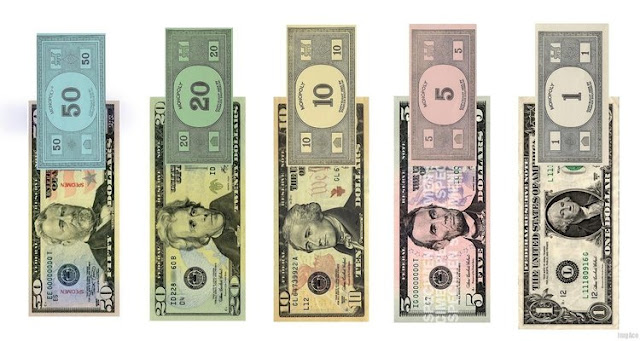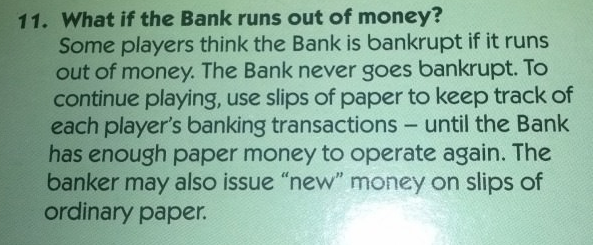The Credit Ran Out, And The Band Played On
Did you ever play in a Monopoly game where the bank ran out of printed funny money? What was your remedy? Dwell on that one, answer below.
Notice how the Monopoly money colors match the real thing? Coincidence? Moving West...
Excerpt from "Beckoning Frontiers" by Marriner Eccles, Fed Chairman 1934-1948:
As mass production has to be accompanied by mass consumption, mass consumption, in turn, implies a distribution of wealth - not of existing wealth, but of wealth as it is currently produced - to provide men with buying power equal to the amount of goods and services offered by the nation's economic machinery. Instead of achieving that kind of distribution, a giant suction pump had by 1929-30 drawn into a few hands an increasing portion of currently produced wealth. This served them as capital accumulations. But by taking purchasing power out of the hands of mass consumers, the savers denied to themselves the kind of effective demand for their products that would justify a reinvestment of their capital accumulations in new plants. In consequence, as in a poker game where the chips were concentrated in fewer and fewer hands, the other fellows could stay in the game only by borrowing. When their credit ran out, the game stopped.
From Jeremy Robson: The Negative Employment Effect of New Technology in the US
"If this is correct [Eccles above] then new technology is bound by the ability to consume it. If there is no money to pay for the products that new technology is creating then eventually the rate of growth of new technology will slow."
From Fed Chair Janet Yellen: "For lower-income families, what we find is sobering. The median net worth reported by the bottom fifth of households by income was only $6,400 in 2013. Among this group, representing about 25 million American households, many families had no wealth or had negative net worth. The next fifth of households by income had median net worth of just $27,900. These numbers represent declines from 2010. One reason is that income has continued to fall for these families. Home equity accounts for the lion's share of wealth for most families and many of these families have not yet recovered the wealth they lost in the housing crisis."
Notice how the Monopoly money colors match the real thing? Coincidence? Moving West...
As mass production has to be accompanied by mass consumption, mass consumption, in turn, implies a distribution of wealth - not of existing wealth, but of wealth as it is currently produced - to provide men with buying power equal to the amount of goods and services offered by the nation's economic machinery. Instead of achieving that kind of distribution, a giant suction pump had by 1929-30 drawn into a few hands an increasing portion of currently produced wealth. This served them as capital accumulations. But by taking purchasing power out of the hands of mass consumers, the savers denied to themselves the kind of effective demand for their products that would justify a reinvestment of their capital accumulations in new plants. In consequence, as in a poker game where the chips were concentrated in fewer and fewer hands, the other fellows could stay in the game only by borrowing. When their credit ran out, the game stopped.
From Jeremy Robson: The Negative Employment Effect of New Technology in the US
"If this is correct [Eccles above] then new technology is bound by the ability to consume it. If there is no money to pay for the products that new technology is creating then eventually the rate of growth of new technology will slow."
From Fed Chair Janet Yellen: "For lower-income families, what we find is sobering. The median net worth reported by the bottom fifth of households by income was only $6,400 in 2013. Among this group, representing about 25 million American households, many families had no wealth or had negative net worth. The next fifth of households by income had median net worth of just $27,900. These numbers represent declines from 2010. One reason is that income has continued to fall for these families. Home equity accounts for the lion's share of wealth for most families and many of these families have not yet recovered the wealth they lost in the housing crisis."
The Nattering One muses... Answer to the above question, refer to Section 1.1 of Monopoly FAQ:
Since 1995, growth was propped up by investment bubbles (dot.com, housing) that were major mistakes. As previously discussed, the run up in household net worth during the housing bubble cushioned falling incomes. Since the housing crisis, increases in overall net worth have been due to another major mistake, an artificial reflation of the housing bubble and inflated equity assets.
Yellen's comments witness that participation in the net worth increase has been limited to the upper echelons that have large portfolios and may not have, or could afford to, lose their housing ATM. Demand is falling because real wage growth is negative, incomes keep falling, and the cushion for spending beyond ones means, the housing ATM, was foreclosed on for many.
"Mass consumption, in turn, implies a distribution of wealth - not of existing wealth, but of wealth as it is currently produced - to provide men with buying power equal to the amount of goods and services offered by the nation's economic machinery." We've Nattered before about all those Chinese FoxConn employees, cheap foreign "labor at the margin", being able to "afford" the IPad's and other crap they overproduce. Who can afford it?
Since 1995, growth was propped up by investment bubbles (dot.com, housing) that were major mistakes. As previously discussed, the run up in household net worth during the housing bubble cushioned falling incomes. Since the housing crisis, increases in overall net worth have been due to another major mistake, an artificial reflation of the housing bubble and inflated equity assets.
Yellen's comments witness that participation in the net worth increase has been limited to the upper echelons that have large portfolios and may not have, or could afford to, lose their housing ATM. Demand is falling because real wage growth is negative, incomes keep falling, and the cushion for spending beyond ones means, the housing ATM, was foreclosed on for many.
"Mass consumption, in turn, implies a distribution of wealth - not of existing wealth, but of wealth as it is currently produced - to provide men with buying power equal to the amount of goods and services offered by the nation's economic machinery." We've Nattered before about all those Chinese FoxConn employees, cheap foreign "labor at the margin", being able to "afford" the IPad's and other crap they overproduce. Who can afford it?
With dwindling assets, wages and household income, I wouldn't look to the financially hamstrung American middle class.
No, they don't and with a dwindling American middle class, "the other fellows could stay in the game only by borrowing. When their credit ran out, the game stopped." when the credit runs out, this game is over.






Comments